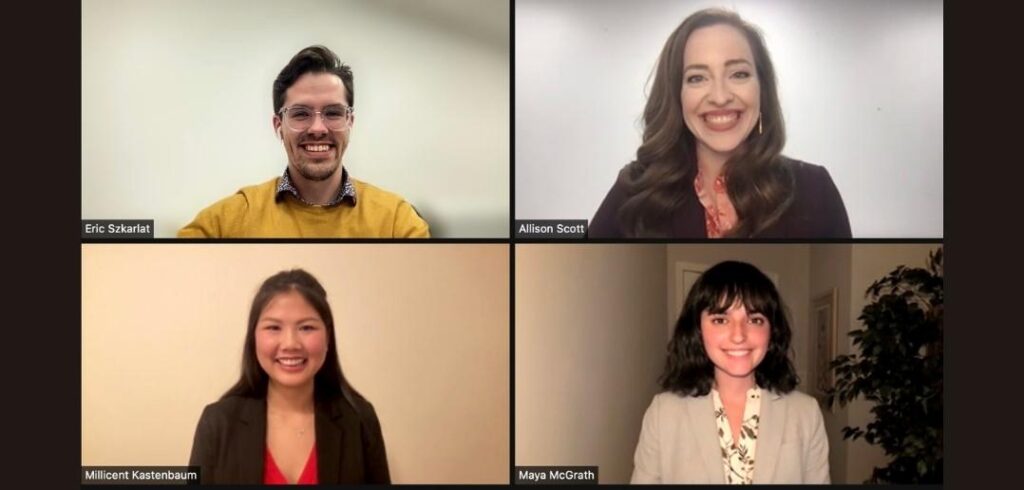Fordham Law’s Moot Court started its 2021-22 competition season off strong after a team of 2Ls placed in the top two of 24 teams at the 27th Annual Burton D. Wechsler National First Amendment Moot Court Competition.
Hosted by the American University Washington College of Law, the Burton D. Wechsler National First Amendment Moot Court Competition is a renowned tournament that presents teams across the country the opportunity to argue cutting-edge cases in front of renowned judges in the nation’s capital. Following last year’s cancellation due to the coronavirus pandemic, this year’s competition was held virtually.
Millicent Kastenbaum ’23, Maya McGrath ’23, and Allison Scott ’23 represented Fordham Law in this year’s competition. Eric Szkarlat ’22, who competed in the Spong Moot Court Tournament at William & Mary Law School virtually last year, coached the team this semester.
Previous Wechsler competition problems have addressed a wide variety of First Amendment issues including speech by public officials, municipal regulation of businesses, the rights of public school students, and legislator-led prayer. This year’s hypothetical problem focused on issues that explored different legal arguments about free speech rights and free exercise and establishment clauses.
A Two-Day Marathon of Oral Arguments
To prepare for the Wechsler competition, Szkarlat helped recreate the fast-paced atmosphere of the competition by mooting both in person and over Zoom.
“Even though it was going to be a virtual competition, I wanted [the competitors]to have some in-person arguing experience with their classmates,” Szkarlat said of his decision to have the team meet every Monday in Fordham Law’s moot courtroom during the fall semester. “It was the competitors’ first experience with arguing in person, which they loved, and … I thought it was going to be important that they had that experience in order to carry the torch forward.”
Nine weeks of constantly honing their brief writing and oral advocacy skills came down to two days of rigorous competition rounds in late October. After facing off against two award-winning brief teams in the preliminary rounds on Oct. 23, Fordham Law advanced onto the octofinal round (with the Top 16 teams vying for the Top 8 spots), to the quarterfinals with Mercer University, and then to the semifinals with Syracuse Law the following day.
Adrenaline ran high as the three Fordham Law competitors showcased their knowledge of case law during the four rounds on Oct. 24. Following Kastenbaum’s “pitch-perfect” performance in the semifinals that helped send Fordham Law to the finals, Szkarlat said the team had less than 30 minutes to prepare for the last round against UC Hastings Law.
At that time, McGrath and Scott (who served as the swing throughout the competition) argued the petitioner’s side before a distinguished panel of sitting judges, including the Honorable Judge Tim Dyk of the U.S. Court of Appeals for the Federal Circuit, the Honorable Justice Leondra Kruger of the California Supreme Court, and the Honorable Judge Reggie Walton of the U.S. District Court for D.C.
“I’m from California,” McGrath explained, “so when we argued in front of Justice Leondra Kruger, that was very special and I was very excited and humbled.”
“By far, my favorite part [of the competition]was arguing in front of all the judges,” she added. “All the hard work really paid off.”
It Takes a Village
The students agreed that they could not have made it so far without the help of Szkarlat, other Fordham Law students, and Fordham Law alumni.
This year’s Wechsler bench team, who helped with mooting, was composed of student coach Myrna Nakhla ’22 and members Ross Jablon ’23, Lauren Kim ’23, Morgan LaPeter ’23, Chloe Marmet ’23, and Tanecia Vasquez ’23. Nine Fordham Law alumni, alongside Professors Abner Greene and Michelle Mancino Marsh ’96, also helped moot the team on Thursday nights.
“They’re all very much an integral part of the [moot court]system,” Kastenbaum said. “This win is also very much theirs as well.”
“This whole experience really pushed all of us to a place where I didn’t even know we could get to,” she added, “I’m forever grateful for Eric, my teammates, and this experience for making me a better writer, better speaker, and hopefully a better lawyer.”
For Scott, this second-place win was a confidence booster as she approaches the halfway mark of her law school career.
“I do feel like I’ve improved in my writing, research, and advocacy skills all around, which are so important,” Scott said. “I’m definitely looking forward to more moot court competitions and events because I think that the power of words and oral advocacy is really special.”

